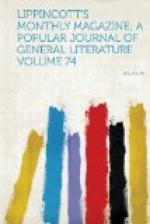“A little,” said Sir Robert affably, who could truthfully have said as much of anything. “Who is this Glass?”
“Oh, he’s the man that owns all this; the stupidest owl that ever lived. I wish he could catch on like you. I’d like very well to work with you,” was the reply.
“A bumptious fellow, that,” commented Mr. Heathcote when they left. “He’d ‘like to work with you,’ indeed!”
“A fellow with ideas. I’d like to work with him,” replied his uncle; “though he isn’t burdened with respect for his employers.”
Miss Noel meanwhile tied on her large straw hat, took her cane, basket, trowel, tin box, and, followed by Parsons with her sketching-apparatus, went off to hunt plants or wash in sketches, a most blissfully occupied and preoccupied old lady.
To Mr. Ketchum’s great amusement, Miss Noel, Mrs. Sykes, and Mr. Heathcote all arrived at a particular spot within a few moments of each other one morning, all alike prepared and determined to get the view it commanded.
Miss Noel had said to Job en route, “Do you think that I shall be able to get a fly and drive about the country a bit? I should so like it. Are they to be had there?”
And he had replied, “You will have some difficulty in not taking ’a fly’ there, I guess. The hackmen would rather drive your dead body around town for nothing than let you enjoy the luxury of walking about unmolested. But I will see to all that.”
Accordingly, a carriage had been placed at their disposal, and they had taken some charming drives, in the course of which Parsons, occupying the box on one occasion, was seen to be peering very curiously about her.
“A great pity, is it not, Parsons, that we can’t see all this in the autumn, when the thickets of scarlet and gold are said to be so very beautiful?” said Miss Noel, addressing her affably.
“Yes, mem,” agreed Parsons. “And, if you please, mem, where are the estates of the gentry, as I ‘ave been lookin’ for ever since we came hover?”
“Not in this part,” replied Miss Noel. “The red Indians were here not very long since. You should really get a pin-cushion of their descendants, those mild, dirty creatures that work in bark and beads. Buy of one that has been baptized: one shouldn’t encourage them to remain heathens, you know. Your friends in England will like to see something made by them; and they were once very powerful and spread all over the country as far as—as—I really forget where; but I know they were very wild and dreadful, and lived in wigwams, and wore moccasins.”
“Oh, indeed, mem!” responded Parsons, impressed by the extent of her mistress’s information.
“A wigwam is three upright poles, such as the gypsies use for their kettles, thatched with the leaves of the palm and the plantain,” Miss Noel went on. “Dear me! It is very odd! I certainly remember to have read that; but perhaps I am getting back to the Southern Americans again, which does so vex Robert. I wonder if one couldn’t see a wigwam for one’s self? It can’t be plantain, after all: there is none growing about here.”




